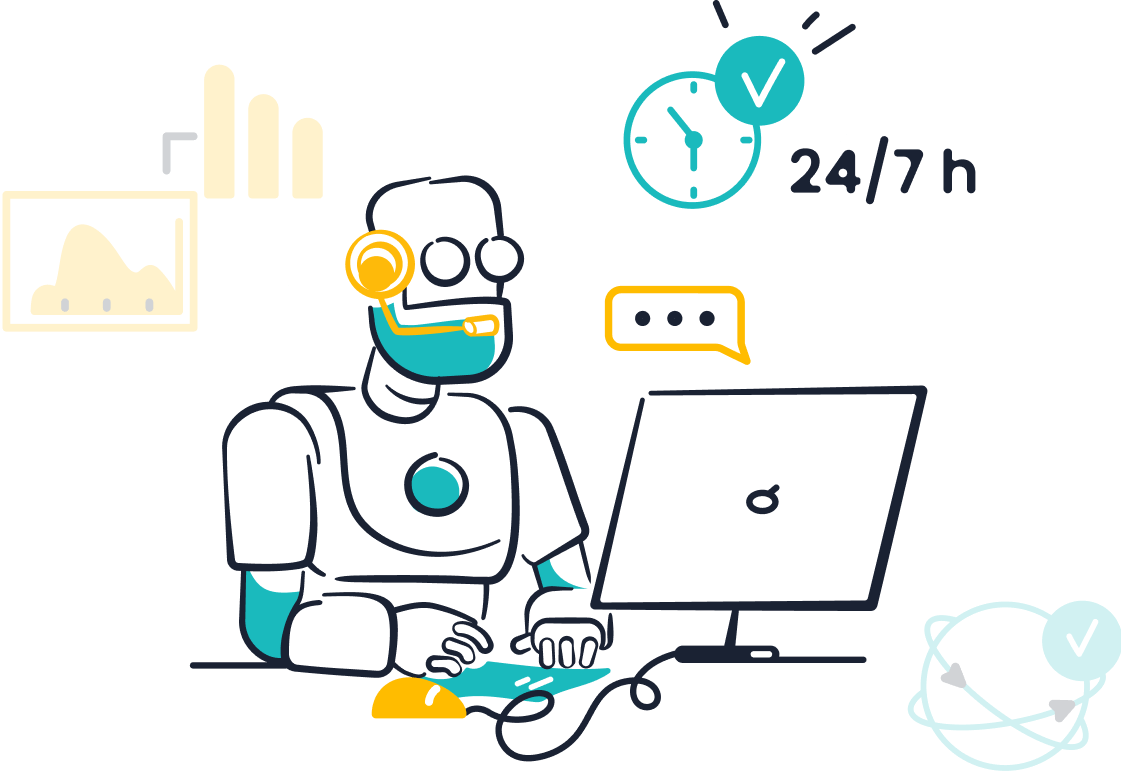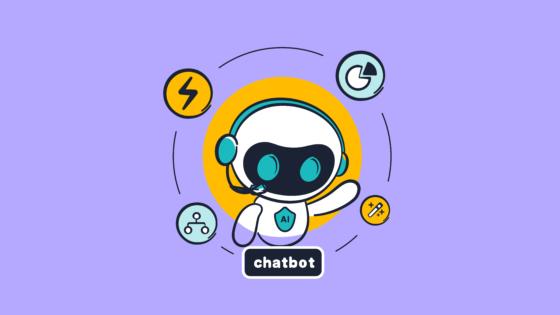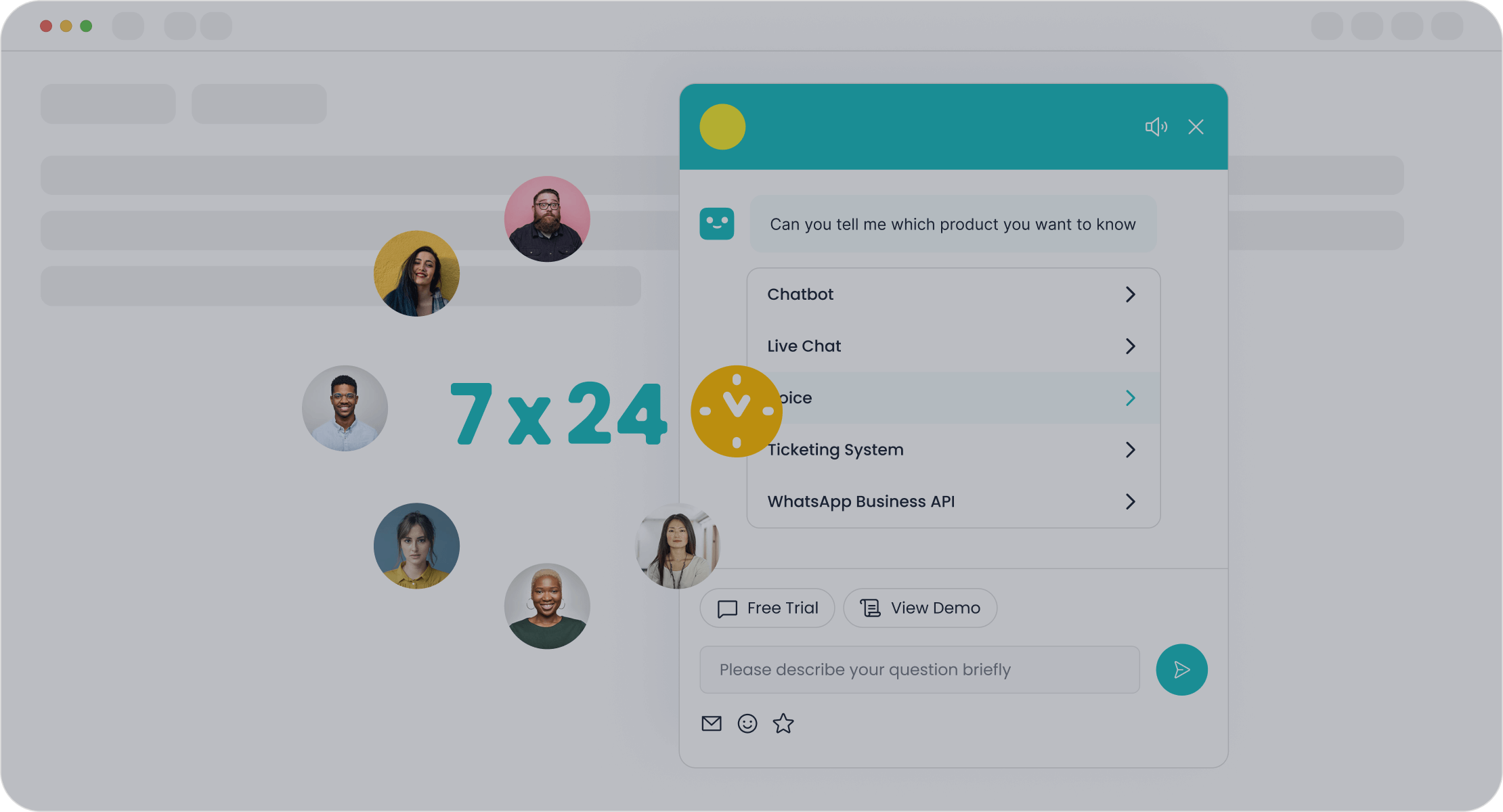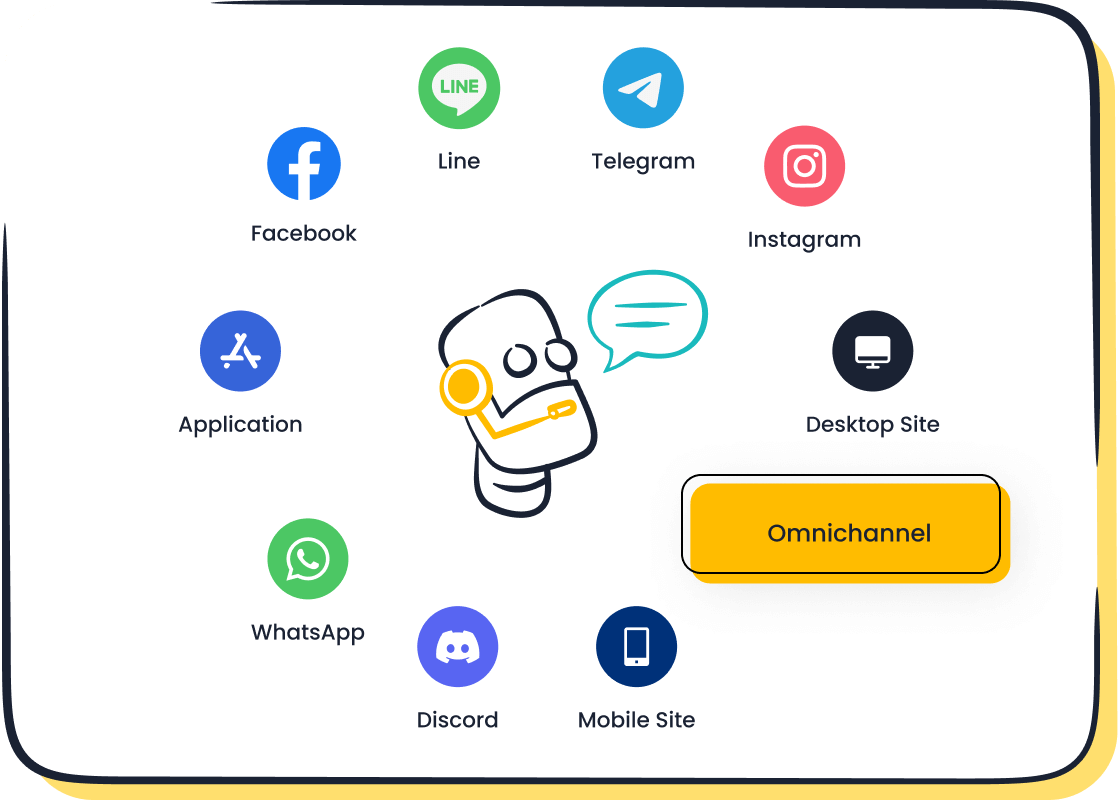Reviewing the Best AI Customer Support Software Today

AI has revolutionized how businesses handle customer interactions, making it easier to provide faster, more efficient, and personalized support using the best AI customer support software. A 2023 Gartner study reveals that 80% of companies already use AI to enhance customer experience, while 36% of experts highlight its role in ensuring 24/7 availability. AI-driven assistance not only reduces response times but also improves customer satisfaction by automating repetitive tasks and offering personalized support. For instance, Klarna reduced response times from hours to seconds and cut operational costs by 45% through AI automation capabilities. With Sobot, businesses can leverage AI customer support software to achieve their customer experience objectives while scaling operations seamlessly.
What is AI Customer Support Software?
Definition and Overview
What is AI in customer support?
AI in customer support refers to the use of advanced technologies like machine learning and natural language processing to automate and enhance customer interactions. These tools analyze customer queries, provide instant responses, and assist human agents in delivering efficient support. For example, AI chatbots can handle repetitive questions, allowing your team to focus on complex issues. This approach not only improves productivity but also elevates the overall customer experience.
Key features of AI customer support software
AI customer support software comes with several essential features:
- Omnichannel support: Engage with customers across platforms like email, WhatsApp, and SMS.
- Automation capabilities: Automate repetitive tasks such as ticketing and query resolution.
- Personalization: Tailor responses based on customer history and preferences.
- 24/7 availability: Provide round-the-clock support to meet customer needs anytime.
- Data analytics: Gain insights into customer behavior and support performance.

Sobot’s AI chatbot exemplifies these features by offering multilingual support, seamless integration, and a no-coding-required setup, making it a versatile tool for businesses.
Benefits of Using AI in Customer Support
Improved response times and availability
AI tools for customer service significantly reduce response times. Studies show a 37% drop in first response times and a 52% faster ticket resolution rate. For instance, AkzoNobel reduced its average response time from six hours to just 70 minutes using AI. With 24/7 availability, AI ensures your customers receive timely assistance, enhancing their satisfaction and loyalty.
Enhanced customer satisfaction and personalization
AI customer service tools improve customer satisfaction by delivering personalized experiences. By analyzing customer data, AI tailors responses to individual needs, creating a sense of engagement and care. For example, AI-enabled teams report a 35% increase in the quality and consistency of support. This level of personalization fosters stronger customer relationships and boosts retention rates.
Common Applications
Chatbots and virtual assistants
Chatbots are among the most popular applications of AI in customer service. They handle routine queries, guide customers through processes, and even assist with purchases. Sobot’s AI chatbot, for example, operates 24/7, supports multiple languages, and uses proactive messaging to boost conversions by 20%. These tools free up your team to focus on more strategic tasks.
Automated ticketing and workflow management
AI-powered ticketing systems streamline workflows by categorizing and prioritizing customer issues. Companies using these systems report a 44% faster issue resolution rate and a 59% reduction in waiting times. For example, Unity saved $1.3 million by reducing ticket volumes with AI automation. This efficiency not only saves costs but also improves customer satisfaction.
Top AI Customer Support Tools Today

Zendesk
Features and Capabilities
Zendesk offers a range of features designed to streamline customer interactions. Its ticketing system organizes customer queries across multiple channels, including email, live chat, and social media. The platform also provides a customizable dashboard for tracking key metrics like response times and resolution rates. However, Zendesk's AI capabilities, such as intent detection, are limited compared to other tools, classifying only 60% of customer issues accurately. Additionally, its reliance on Google Translate for multilingual support results in higher translation error rates.
Pros and Cons
- Pros:
- Highly customizable dashboard.
- Comprehensive reporting and analytics tools.
- Cons:
- Steep learning curve for new users.
- Fragmented platform leads to siloed data sources.
Pricing Overview
Zendesk's pricing starts at $149 per month for one user. While it offers robust features, the cost may be prohibitive for small businesses.
Sobot Chatbot
Features and Capabilities
The Sobot Chatbot stands out as one of the best AI customer support software options available today. It offers omnichannel support, allowing you to interact with customers across platforms like WhatsApp and SMS. The chatbot operates 24/7, providing instant replies in multiple languages. Its no-coding-required setup makes it accessible to businesses of all sizes. Additionally, the chatbot uses a knowledge base built from various sources, ensuring accurate and intelligent responses.
Benefits and Use Cases
Sobot Chatbot enhances efficiency by automating repetitive tasks, improving productivity by 70%. It reduces inbound discussion volume by 20% and increases customer satisfaction rates to 95%. Businesses have reported a 35% rise in sign-off rates and a 40% boost in COD collection rates. For example, OPPO achieved an 83% chatbot resolution rate and a 94% positive feedback rate after implementing Sobot's solutions.
Pricing Overview
Sobot offers flexible pricing tailored to your business needs. For more details, visit Sobot Chatbot Pricing.
Chatfuel AI
Features and Capabilities
Chatfuel AI specializes in creating AI chatbots for customer service. Its platform supports automation of routine queries, reducing the need for human intervention. Chatfuel's AI tools for customer service include features like intent detection and real-time analytics. However, its automation rate and query resolution capabilities are less advanced compared to Sobot.
Pros and Cons
- Pros:
- User-friendly interface.
- Affordable pricing for small businesses.
- Cons:
- Limited scalability for large enterprises.
- Lower customer satisfaction scores compared to competitors.
Pricing Overview
Chatfuel AI offers a free plan with basic features, while premium plans start at $15 per month. This makes it a cost-effective option for startups and small businesses.
Tidio
Features and Capabilities
Tidio offers a robust AI customer support software solution designed to enhance customer interactions. Its AI-powered chatbots provide 24/7 availability, enabling businesses to handle routine queries efficiently. The platform integrates seamlessly with popular communication channels like email and live chat, ensuring omnichannel support. Tidio also includes advanced automation features, such as automated ticketing and workflow management, which reduce manual effort. Additionally, its real-time analytics help you monitor performance and optimize customer service strategies. These features make Tidio a versatile tool for businesses aiming to improve customer satisfaction and streamline operations.
Pros and Cons
- Pros:
- Easy-to-use interface suitable for small and medium-sized businesses.
- Strong automation capabilities that reduce response times.
- Cons:
- Limited scalability for larger enterprises.
- Fewer customization options compared to some competitors.
Pricing Overview
Tidio offers a free plan with basic features, making it accessible for startups. Paid plans start at $25 per month, providing advanced features like AI chatbots and analytics. Businesses like ADT Security Services have reported a 30% increase in customer satisfaction and a 22% reduction in response time after implementing Tidio. This balance of quality and cost makes it a competitive choice for small businesses.
Fin
Features and Capabilities
Fin is an AI customer support software that focuses on delivering high-quality customer experiences. Its AI-driven chatbots excel at handling complex queries, offering personalized responses based on customer data. Fin supports multiple communication channels, ensuring seamless interactions across platforms. The software also includes advanced reporting features, allowing you to track key metrics like resolution rates and customer satisfaction. With its focus on personalization and efficiency, Fin helps businesses improve their support operations and build stronger customer relationships.
Pros and Cons
- Pros:
- Advanced AI capabilities for handling complex queries.
- Comprehensive reporting tools for performance tracking.
- Cons:
- Higher pricing compared to similar tools.
- Steeper learning curve for new users.
Pricing Overview
Fin’s pricing starts at $99 per month, which may be a barrier for smaller businesses. However, its advanced features justify the cost for enterprises seeking top-tier AI customer support software. Companies using Fin have reported significant improvements in customer satisfaction and operational efficiency, making it a valuable investment for those with larger budgets.
How to Choose the Right Tool
Assessing Your Business Needs
Identifying pain points in your current customer support process
Understanding your challenges is the first step in selecting the best AI customer support software. Start by analyzing your current customer interactions. Look for recurring issues, such as long response times or unresolved queries. Use tools like sentiment analysis to uncover customer frustrations. For example, 77% of people view brands more positively when they act on feedback. Social listening and market research can also reveal unmet needs and competitor shortcomings. By identifying these pain points, you can prioritize features like chatbots or ticketing systems to address them effectively.
Determining the scale and scope of your support operations
Evaluate the size of your customer base and the complexity of your operations. Businesses with high interaction volumes may need AI tools for customer service that handle scalability. For instance, Sobot’s AI chatbot operates 24/7 and supports multiple languages, making it ideal for global businesses. Use metrics like query resolution accuracy and response times to assess your needs. The table below outlines key criteria to consider:
| Criteria | Description |
|---|---|
| Query resolution accuracy | Percentage of queries resolved accurately on the first attempt. |
| Response time metrics | Average response times compared to industry benchmarks. |
| Compliance and governance | Adherence to industry standards and regulations. |
| Data security | Robust measures to protect stored data. |
Key Selection Criteria
Ease of integration with existing systems
Choose AI customer service tools that blend seamlessly with your current software. Integration ease ensures smooth workflows and reduces disruptions. For example, Sobot’s chatbot integrates with platforms like WhatsApp and SMS, unifying customer interactions across channels. This feature simplifies operations and enhances customer satisfaction.
Customization and scalability options
Customization allows you to tailor the tool to your brand’s voice and customer needs. Scalability ensures the software grows with your business. Sobot’s AI chatbot offers both, enabling businesses to adapt workflows without coding. Evaluate the tool’s ability to handle increased usage and concurrent interactions effectively.
Budget and pricing considerations
Understand the total cost of ownership, including setup, maintenance, and upgrades. While some tools offer free plans, advanced features may require higher investments. Sobot provides flexible pricing tailored to your needs, ensuring cost-effectiveness without compromising on features.
Evaluating Vendors
Importance of customer reviews and case studies
Customer reviews and case studies provide valuable insights into a tool’s performance. Look for documented success stories, like OPPO’s use of Sobot’s chatbot, which achieved an 83% resolution rate and a 94% positive feedback rate. These examples highlight the tool’s reliability and effectiveness.
Availability of free trials or demos
Free trials or demos let you test the software’s features before committing. They help you evaluate usability, integration, and overall performance. Sobot offers demos to showcase its AI-powered solutions, ensuring you make an informed decision.
Implementation Tips
Preparing for Integration
Training your team on the new tool
Effective team training ensures a smooth adoption of AI customer service tools. Begin by introducing the features of the software and demonstrating its practical applications. Use hands-on sessions to familiarize your team with the tool’s interface and capabilities. Regular assessments linked to key performance indicators (KPIs) help track progress and identify areas for improvement.
- Continuous monitoring and feedback loops enhance skill development.
- Practical applications of AI skills in real scenarios improve confidence.
- Evaluations tied to KPIs measure the training's impact on performance.
Sobot’s AI chatbot, for instance, offers a no-coding-required setup, making it easier for teams to adapt quickly and efficiently.
Ensuring data security and compliance
Data security is critical when integrating AI customer support software. Establish protocols to protect sensitive customer information and comply with industry regulations.
- 68% of financial firms prioritize AI in risk and compliance.
- Nearly 38% of companies fail to validate AI outputs, highlighting the need for robust evaluation.
- 80% of cybersecurity professionals believe AI benefits outweigh risks.
Sobot ensures compliance with global standards, providing businesses with a secure and reliable platform for customer interactions.
Best Practices for a Smooth Transition
Starting with a pilot program
A pilot program allows you to test the AI tools for customer service on a smaller scale before full implementation. This approach minimizes risks and identifies potential challenges.
- 36% of experts highlight AI’s role in ensuring 24/7 customer service availability.
- Businesses using pilot programs report a 27% reduction in average handle time.
- AkzoNobel reduced response times from six hours to 70 minutes through AI.
Sobot’s flexible pricing and customizable features make it an ideal choice for pilot testing.
Gathering feedback and making adjustments
Collect feedback from both customers and team members during the pilot phase. Use this input to refine workflows and optimize the tool’s performance. Regular updates based on feedback ensure the software meets your business needs effectively.
Measuring Success
Tracking key performance metrics
Monitor KPIs to evaluate the success of your AI customer service implementation. Key metrics include:
| KPI Category | Key Metrics |
|---|---|
| Operational Efficiency | Process Times, Error Rates, Automation Levels |
| Customer Satisfaction | Response Times, Service Quality, Customer Retention Rates |
| Revenue Growth | New Leads Generated, Upsell Rates, Contribution to Sales |
Time savings and customer satisfaction improvements are strong indicators of success.
Continuously optimizing the tool’s performance
AI customer support software requires ongoing optimization. Analyze performance data regularly to identify areas for improvement. For example, Sobot’s chatbot provides detailed analytics, helping businesses refine their strategies and enhance customer experiences.
Future Trends in AI Customer Support

Emerging Technologies
AI-powered sentiment analysis
AI-powered sentiment analysis is transforming how you can understand and respond to customer emotions. By analyzing text, tone, and context, this technology identifies whether a customer feels satisfied, frustrated, or neutral. For example, predictive analytics combined with sentiment analysis can anticipate customer needs before they even express them. This allows you to tailor responses and improve interactions. A recent study shows that 96% of executives believe generative AI enhances customer engagement, while 88% think automated systems boost loyalty. These tools help you create more personalized and empathetic customer experiences, fostering stronger relationships.
Voice-based AI assistants
Voice-based AI assistants are becoming a game-changer in customer support. These tools allow customers to interact with your business using natural language, making the experience more intuitive. For instance, voice assistants can handle complex queries, provide step-by-step guidance, and even process transactions. With 84% of executives already using AI for client interactions, voice-based assistants are expected to grow rapidly. They not only improve efficiency but also reduce wait times, ensuring customers receive timely and accurate support. This technology is especially useful for industries like retail and healthcare, where quick resolutions are critical.
Predictions for the Next 5 Years
Increased adoption of AI in small businesses
AI is no longer exclusive to large enterprises. Small businesses are increasingly adopting AI tools to enhance customer support. By 2025, 80% of companies are expected to use AI-powered chatbots, enabling them to provide 24/7 assistance without increasing costs. These tools automate repetitive tasks, allowing you to focus on more strategic activities. For example, Sobot’s AI chatbot offers a no-coding-required setup, making it accessible for businesses of all sizes. This trend will empower small businesses to compete with larger players by delivering efficient and personalized customer service.
Greater focus on hyper-personalization
Hyper-personalization will define the future of customer interactions. AI tools will analyze vast amounts of data to deliver tailored experiences. By 2026, conversational AI is projected to reduce contact center labor costs by $80 billion, freeing up resources for personalized support. For example, AI can recommend products based on a customer’s purchase history or predict their needs using behavioral data. This level of personalization not only boosts satisfaction but also increases loyalty. As AI continues to evolve, you can expect even more innovative ways to connect with your customers on a deeper level.

AI customer support software has become essential for modern businesses aiming to improve efficiency, enhance customer satisfaction, and scale operations. These tools automate repetitive tasks, provide 24/7 support, and deliver personalized experiences, making them invaluable for businesses of all sizes.
Here’s a quick recap of the key benefits offered by the best AI customer support software reviewed in this article:
| Feature/Benefit | Description |
|---|---|
| Multilingual Support | Expands customer reach with support in multiple languages. |
| Knowledge Base Integration | Utilizes existing knowledge bases for quick and relevant customer support. |
| Human Agent Support Options | Allows seamless transition to human agents for complex queries. |
| AI Learning | Continuously improves response quality by learning from interactions. |
| Ticketing Platform | Efficiently manages customer inquiries with a powerful ticketing system. |
| Live Chat Software | Enhances real-time customer interaction for better satisfaction. |
| Integrated Reporting and Analytics | Provides insights into support performance and customer trends. |
| Automation Capabilities | Reduces response times and improves service quality by automating routine tasks. |
| Ease of Integration | Ensures seamless integration with existing systems, enhancing overall efficiency. |
| User Experience | An intuitive interface is crucial for effective utilization of the software. |
| Cost and Scalability | Offers scalability to accommodate business growth without significant price jumps. |
| Support and Training | Adequate resources from providers ensure teams can maximize software capabilities. |
Sobot’s AI chatbot exemplifies these benefits, offering multilingual support, automation, and seamless integration to help businesses achieve their customer service goals.
Take the next step by exploring free trials, consulting vendors, and implementing the right AI tools to transform your customer support operations. With the right software, you can enhance customer satisfaction and drive long-term success.
FAQ
What is the main purpose of AI customer support software?
AI customer support software automates repetitive tasks, improves response times, and enhances customer satisfaction. It helps you provide 24/7 assistance, personalize interactions, and streamline workflows. For example, Sobot’s AI chatbot operates round-the-clock, handling queries efficiently while freeing your team to focus on complex issues.
How does AI improve customer satisfaction?
AI improves customer satisfaction by delivering faster, more personalized responses. It analyzes data to understand customer needs and tailors interactions accordingly. For instance, businesses using AI tools like Sobot report a 20% boost in conversions and a 95% satisfaction rate due to proactive and intelligent support.
Can AI tools integrate with existing customer support systems?
Yes, most AI tools integrate seamlessly with existing systems. Sobot’s AI chatbot, for example, connects with platforms like WhatsApp and SMS, unifying customer interactions. This integration ensures smooth workflows and enhances the overall support experience without requiring significant changes to your current setup.
Are AI chatbots suitable for small businesses?
AI chatbots are ideal for small businesses. They reduce costs by automating routine tasks and operate 24/7 without additional staffing. Sobot’s no-coding-required chatbot offers an affordable, scalable solution, making it accessible for businesses of all sizes to improve customer support.
How do I measure the success of AI customer support tools?
You can measure success by tracking metrics like response times, resolution rates, and customer satisfaction scores. Tools like Sobot provide detailed analytics, helping you evaluate performance and optimize strategies. For example, OPPO achieved an 83% resolution rate and a 94% positive feedback rate using Sobot’s solutions.
See Also
Evaluating AI Solutions for Enterprise Call Centers
Enhancing Efficiency with AI Customer Service Tools
Navigating AI Software for Call Center Operations